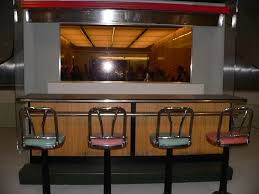counter
英 [ˈkaʊn.tər]
美 [ˈkaʊn.t̬ɚ]
- n. 柜台;对立面;计数器;(某些棋盘游戏的)筹码
- vt. 反击,还击;反向移动,对着干;反驳,回答
- vi. 逆向移动,对着干;反驳
- adj. 相反的
- adv. 反方向地;背道而驰地
使用频率:

记忆方法
记住单词“counter”的方法是将它与“count”结合,想象自己在一个商场或餐厅里,站在计数器(counter)后面,正在数物品,或者计算顾客的数量。这样的场景可以帮你记住“counter”作为计数器或柜台的意思。
以上内容由AI生成, 仅供参考和借鉴
中文词源
counter 柜台
来自count, 数,结帐。
英语词源
- counter
-
counter: see count
- counter (n.)
- mid-14c., "table where a money lender does business," from Old French contouer, comptoir (14c.) "counting room, table of a bank," from Medieval Latin computatorium "place of accounts," from Latin computatus, past participle of computare (see compute). Generalized 19c. from banks to shops, then extended to display cases for goods. Phrase under the counter is from 1926.
- counter (v.)
- "go against," late 14c., from Old French countre "facing opposite" (see counter-). Related: Countered; countering. As an adverb, from mid-15c.; as an adjective, from 1590s.
权威例句
- 1. He could just about see the little man behind the counter.
- 他勉强能看到柜台后面的小个子男人。
- 2. The army now appears to have launched a counter-offensive.
- 军队现在似乎已经发起了反攻。
- 3. The shop assistant received me indifferently while leaning on a counter.
- 商店售货员靠在柜台上漫不经心地招呼我。
- 4. The security forces counter-attacked the following day and quelled the unrest.
- 第二天安全部队发起反击,镇压了骚动。
- 5. Much of the plan runs counter to European agriculture and environmental policy.
- 该计划的很多内容与欧洲农业及环境方面的政策相冲突。